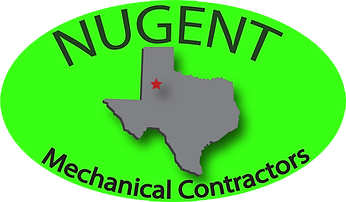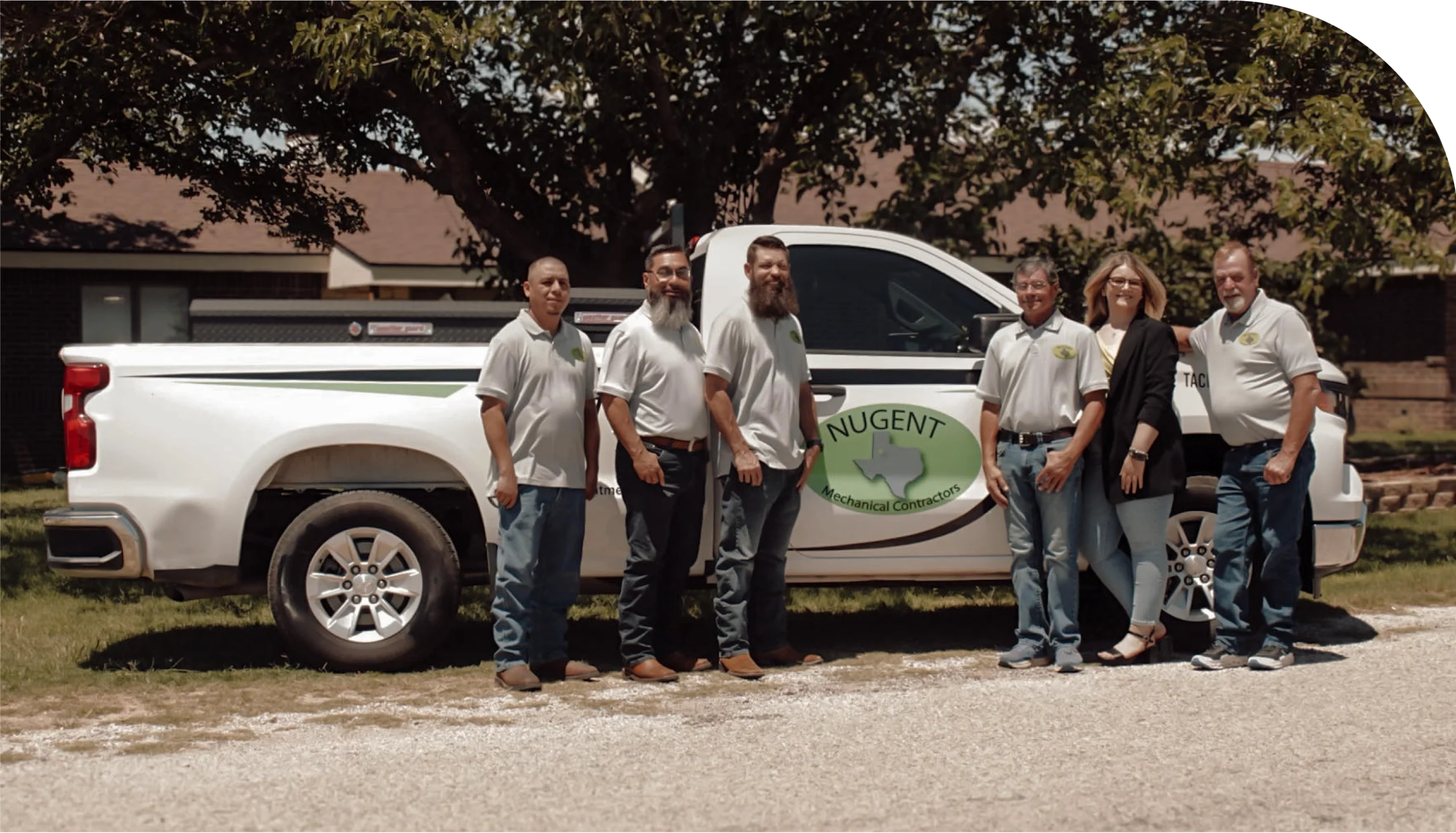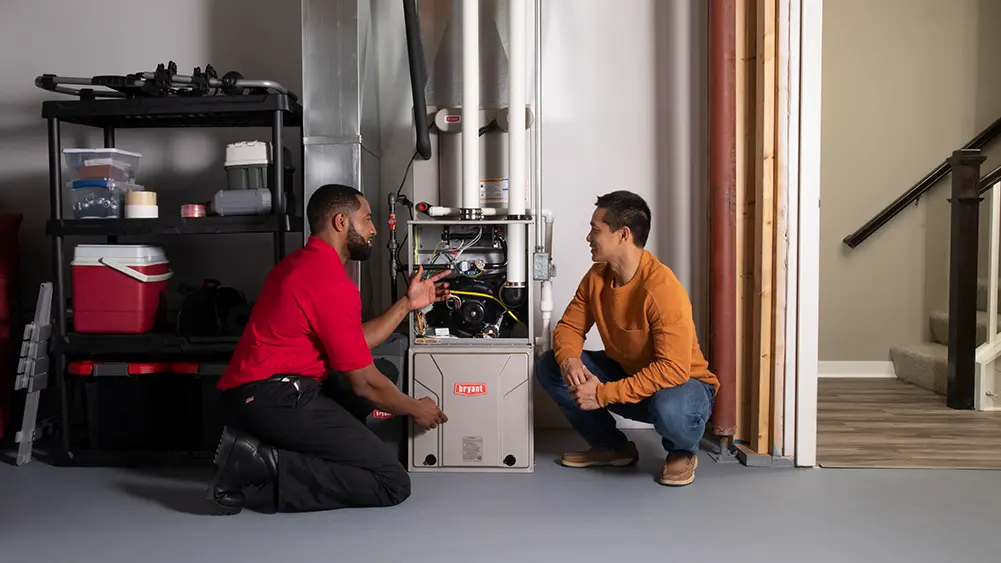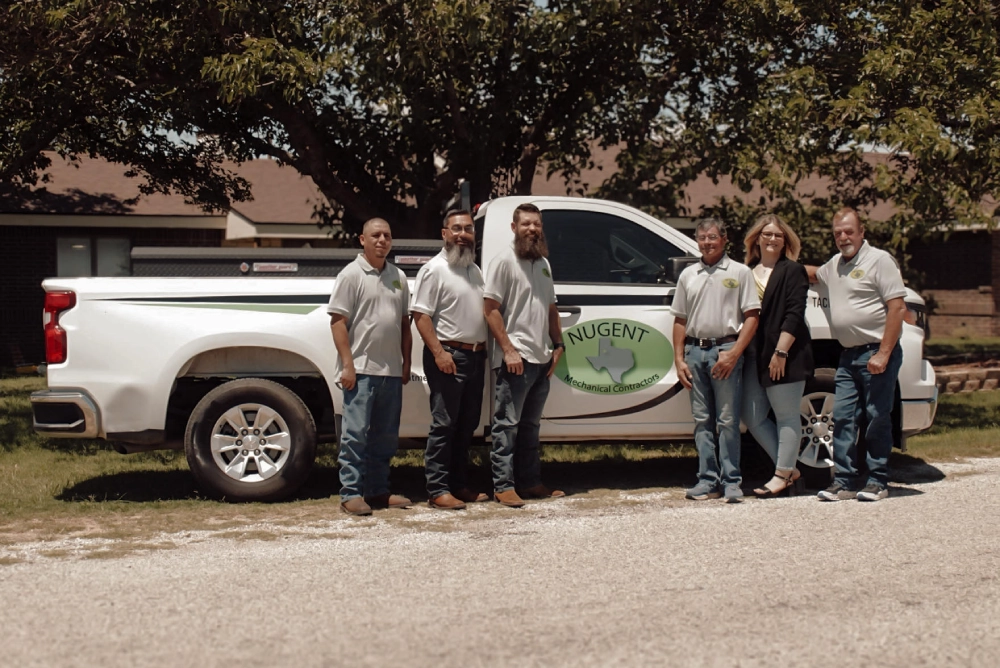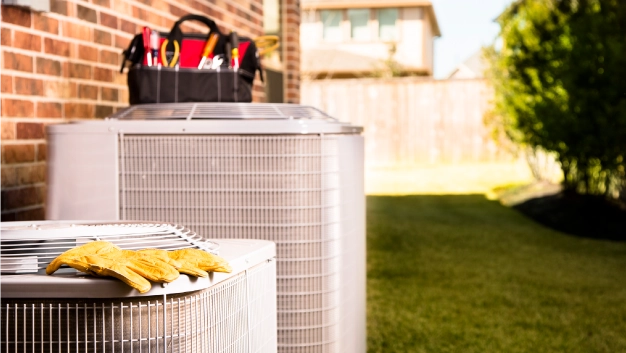The Role of a Heat Pump in Keeping Your Home Comfortable
For homeowners in Lubbock, achieving year-round comfort requires a versatile and efficient solution. While traditional systems rely on separate units for heating and cooling, the modern heat pump offers a single, highly efficient system that handles both. Understanding how this ingenious technology works can show you why it's a smart choice for maintaining perfect indoor temperatures, regardless of the season.
At Nugent Mechanical Contractors, we specialize in installing and servicing heat pumps, helping our customers maximize comfort while minimizing energy bills.
How a Heat Pump Works: The Magic of Moving Heat
The simplest way to understand a heat pump is that it doesn't create heat; it moves heat.
- Summer (Cooling Mode): The heat pump functions exactly like a standard central air conditioner. It extracts heat from the indoor air and releases it outside, using refrigerant to cool your home.
- Winter (Heating Mode): This is where the magic happens. Even when the outside temperature is low, the outdoor air still contains heat energy. The heat pump extracts this low-temperature heat from the outside air, compresses it to increase the temperature, and transfers it inside your home.
Because a heat pump simply transfers existing heat rather than burning fuel (like a gas furnace) or using electrical resistance (like electric baseboard heating), it is exceptionally energy-efficient.
Key Benefits of Choosing a Heat Pump
Heat pumps offer several advantages that make them ideal for the climate we experience in West Texas:
- Exceptional Energy Efficiency: Heat pumps are considered one of the most energy-efficient options for both heating and cooling. They can deliver two to three times more heat energy than the electrical energy they consume. This efficiency directly translates to lower utility bills throughout the year.
- Year-Round Comfort from One Unit: You only need one piece of primary equipment to manage all your temperature control needs. This simplifies maintenance, as you only have one system to tune up annually.
- Improved Dehumidification: Heat pumps are excellent at removing moisture from the air during the cooling cycle, leading to improved air quality and a more comfortable environment in the summer months.
- Safety: Unlike gas furnaces, heat pumps do not burn fuel, eliminating the risks associated with gas leaks or carbon monoxide exposure.
The Role of Supplemental Heat
While modern heat pumps are incredibly efficient, their ability to extract heat from the outside air decreases when temperatures drop well below freezing. In the Lubbock area, we sometimes experience deep cold snaps.
In these conditions, the heat pump relies on a secondary, backup heat source, often called auxiliary heat or strip heat (electric heating coils). This supplemental heat ensures your home stays warm no matter the outdoor temperature. While this electric heat is less efficient than the pump itself, it only engages when truly necessary, ensuring continuous comfort and safety.
If you're considering a highly efficient, all-in-one comfort solution for your home, the heat pump is a superior choice. Contact Nugent Mechanical Contractors today. We'll help you select and install the perfectly sized heat pump system to keep your home comfortable and your energy bills low.
The Racket is Back: Troubleshooting Tips for a Noisy Furnace
Is your furnace auditioning for a heavy metal band? A heating system should operate with a low hum, not a loud clang, screech, or rattle. When your furnace starts making unusual noises, it's not just annoying—it's often a sign that something is loose, worn out, or dangerously close to failing. Ignoring strange sounds can quickly turn a minor repair into a major breakdown.
At Nugent Mechanical Contractors in Lubbock, we help homeowners diagnose and fix noisy furnaces every winter. Here’s a guide to the most common furnace sounds, what they usually mean, and when you absolutely need to call a professional.
Noise Guide: What That Sound Is Telling You
| Noise Type | Likely Cause | What You Can Do |
| Screeching or High-Pitched Squealing | A failing or dry motor bearing or a worn blower belt. The blower motor moves air through your home, and without proper lubrication, the bearings seize up, causing a loud squeal. | Turn the unit off immediately. Running the system can cause the motor to burn out. This requires a professional repair (lubrication or part replacement). |
| Banging or Popping (Loud, Sudden) | Delayed ignition (Gas Furnaces): If gas builds up before the burner ignites, it can result in a small "explosion" when it finally lights. This is serious and can damage the heat exchanger. Ductwork expansion: Sudden, loud metallic pops usually happen when thin ductwork expands or contracts with temperature changes. | If the sound is related to ignition, call us immediately. If it's a duct issue, it's typically annoying but not dangerous. |
| Rattling or Clicking | A loose panel, door, or screw. Can also be loose debris inside the blower compartment. Clicking is often heard before the furnace starts, signaling the ignition sequence, but constant clicking suggests an issue with the ignitor. | Tighten all visible screws and panels. Check for and remove any debris around the exterior of the blower fan. |
| Grinding or Scraping | A broken or severely loose part rubbing against the blower motor or fan housing. This is a serious issue that indicates metal-on-metal contact. | Shut down the furnace immediately. Running it can lead to extensive damage to the blower assembly. |
| Whistling or Howling | Airflow restriction caused by a severely clogged air filter or blocked return air vents. | Replace your air filter immediately. Clear any furniture or objects blocking air returns or vents in your home. |
When to Call Nugent Mechanical
While a loose panel or a dirty filter can be a simple DIY fix, most loud furnace noises signal a mechanical failure that requires professional attention. Never attempt to repair internal components like the heat exchanger, burners, or electrical wiring yourself.
You should call us right away if:
- The noise is a loud screech or grinding sound. This indicates serious motor or bearing failure.
- You hear a loud bang or boom during ignition, which suggests a dangerous delayed ignition or potential heat exchanger damage.
- The noise is persistent, and you can't identify or safely resolve the source.
Ignoring persistent, loud noises is risking a complete, expensive system failure that will likely happen when you need your heat the most. Our certified technicians have the tools to accurately diagnose the source of the noise and provide a lasting, safe repair.
Don't let your furnace keep you up at night. Contact Nugent Mechanical today to schedule an inspection and restore quiet comfort to your home.
Your Annual Must-Do: Why Your Heating System Needs a Professional Tune-Up Every Year
In Lubbock, we rely on our heating systems to battle those sudden, sharp winter chills. But just like your car, your furnace is a complex machine that experiences wear and tear. If you wait for a breakdown before calling for service, you're not only risking a freezing night but also inviting costly repairs.
At Nugent Mechanical, we can't stress this enough: your heating system needs a professional tune-up every single year. This isn't just a recommendation—it's the single most effective way to ensure safety, reliability, and efficiency all season long.
1. Guaranteeing Your Family's Safety
This is the most critical reason for an annual inspection. Furnaces—especially gas models—create heat through combustion. When components wear out, they can create dangerous situations:
- Carbon Monoxide (CO) Leaks: A professional tune-up includes inspecting the heat exchanger for small cracks. A cracked heat exchanger can leak odorless, colorless, and poisonous carbon monoxide into your home. Technicians use specialized tools to check for this silent killer.
- Fire Hazards: Loose wiring, dirty burners, and debris near the ignition system can all pose a fire risk. We check and secure all electrical connections to prevent hazards.
- Gas Leaks: We inspect all gas lines and connections to ensure there are no leaks that could pose an explosion risk.
2. Protecting Your Warranty (A Financial Lifeline)
Almost every major furnace manufacturer's warranty requires proof of annual professional maintenance to remain valid. If your system breaks down and you haven't had a recent tune-up, the manufacturer can void your warranty, leaving you responsible for the entire cost of replacing expensive parts like the heat exchanger or compressor.
A yearly maintenance receipt from Nugent Mechanical is your documented proof that you’ve done your part to protect your investment.
3. Maximizing Energy Efficiency and Saving Money
A dirty, unmaintained furnace has to work harder and run longer to heat your home, which directly translates to higher utility bills.
- Efficiency Restoration: A professional cleaning removes grime and dirt from the burners, blower, and critical components. This simple step restores lost efficiency, often saving homeowners enough money on their utility bills to cover the cost of the tune-up itself.
- Peak Performance: When all components are clean and calibrated, your system runs at peak performance, ensuring warm, consistent air without wasting fuel.
4. Avoiding Costly Mid-Winter Breakdowns
A typical tune-up allows a trained technician to spot minor issues—like a worn blower belt, a failing ignitor, or a low-amperage draw on a motor—before they cause a complete system failure.
- Proactive Repairs: By fixing a $50 component now, you avoid an emergency $500 repair call on Christmas Eve.
- Convenient Scheduling: Scheduling maintenance in the fall allows you to pick a time that works for you, rather than waiting in line for an emergency technician during a regional cold snap.
Schedule Your Tune-Up with Nugent Mechanical
Don't gamble with your family's comfort or safety. An annual pre-season maintenance check is the smartest investment you can make in your home's well-being. Contact Nugent Mechanical today to schedule your professional furnace tune-up and start your winter season with confidence and peace of mind.
Common Furnace Problems and How to Fix Them
When the temperatures drop Lubbock, a reliable furnace isn't just nice to have—it's essential. Most furnace troubles announce themselves with clear symptoms, and knowing how to troubleshoot them can save you time, money, and discomfort.
While some issues require calling a professional, many common problems have simple, DIY solutions. At Nugent Mechanical, we want you to be prepared! Here are the most frequent furnace issues and what you can do to address them.
Problem 1: The Furnace Isn't Producing Heat (or Won't Turn On)
This is the most common and immediate crisis, especially during a cold snap.
| Likely Cause | Your DIY Fix | When to Call Nugent Mechanical |
| Thermostat Issues | Make sure the thermostat is set to "Heat" and the temperature is set at least five degrees higher than the current room temperature. Check or replace the batteries if it's a digital unit. | If the screen is blank or the thermostat won't trigger the furnace after checking the batteries. |
| Tripped Circuit Breaker | Go to your main electrical panel. If the breaker is flipped, reset it by turning it completely OFF, then ON. | If the breaker immediately trips again, this indicates a dangerous electrical short and requires professional attention. |
| Furnace Power Switch | Check the emergency switch (often a red switch near the furnace or in the basement/attic). Ensure it is set to the "ON" position. | If the switch is on but there's still no power to the unit. |
| Clogged Air Filter | A severely dirty filter restricts airflow, causing the system to overheat and shut down as a safety precaution. Replace the filter immediately. | If replacing the filter doesn't restart the unit. |
Problem 2: The Furnace is Blowing Cold Air
Your blower is running, but the air coming out of the vents isn't warm.
- Pilot Light/Ignitor Failure (Gas Furnaces): If the pilot light is out (or the electronic ignitor fails), the furnace can't burn gas to create heat. You can try to safely relight the pilot light following the instructions on your furnace, but if it won't stay lit, the thermocouple may be faulty.
- Dirty Flame Sensor: This safety device ensures the gas valve is closed if the burner flame goes out. If it's covered in soot, it mistakenly senses no flame and shuts off the gas, resulting in cold air. A technician can safely clean or replace this sensor.
- Overheated Unit: The heat exchanger may be so dirty (or the filter so clogged) that the furnace is immediately hitting its safety limit and shutting off the burner.
When to Call: If the pilot light won't stay lit, or if the unit is repeatedly cycling on and off.
Problem 3: Strange Noises Coming from the Furnace
Your furnace should run quietly. Any new or loud sounds indicate a component is failing or broken.
| Noise | What It Likely Means |
| Squealing or Chirping | Usually indicates a problem with the blower motor belt (needs lubrication or replacement) or a failing motor bearing. |
| Banging or Popping | Often caused by expanding/contracting ductwork as the temperature changes, or sometimes by delayed ignition in the burners. |
| Rattling | Could be a loose panel or screw that needs tightening, or debris inside the blower fan. |
When to Call: If the noise is loud, persistent, or accompanied by a loss of heat. Worn belts and bearings put extreme stress on the motor and need immediate repair.
Problem 4: High Energy Bills
The furnace seems to be running fine, but your utility bill is unusually high.
- Lack of Maintenance: This is the biggest culprit. An unmaintained furnace can lose up to 5% of its efficiency each year it goes without a professional tune-up.
- Old Filter: A dirty filter forces the motor to run longer, wasting energy.
- Poor Insulation/Drafts: Your home itself may be losing heat through drafts or poor attic insulation, forcing the furnace to run constantly.
Your DIY Fix: Enroll in a preventive maintenance plan and consistently replace your air filter every 30–90 days. Check windows and doors for drafts.
When to Trust the Professionals
While DIY fixes are great for simple issues like filters and switches, leave anything involving gas lines, electrical components, or internal repairs to the certified technicians at Nugent Mechanical. We use specialized diagnostic tools to locate the problem quickly and safely, ensuring a lasting repair.
Don't ignore the warning signs! Contact us today for reliable service that keeps your furnace running efficiently and safely all winter long.
Carbon Monoxide: Understanding the Silent Danger from Your Furnace
Carbon monoxide (CO) is often called the "silent killer" because it is an odorless, colorless, and tasteless gas that is nearly impossible to detect without specialized equipment. In the winter, one of the most common sources of CO leaks in homes is a malfunctioning or poorly maintained furnace. Since your health and safety are our top priority, Nugent Mechanical Contractors wants to ensure homeowners in Lubbock understand the warning signs and how to protect themselves.
Why Your Furnace Can Leak CO
Natural gas, propane, and oil furnaces burn fuel to create heat. When the fuel burns cleanly, the byproducts (including CO) are safely vented outside through the flue. A leak occurs when:
- A Cracked Heat Exchanger: This is the most common cause. Over time, heat and stress can cause cracks in the heat exchanger, allowing CO to mix with your conditioned air and be distributed throughout your home.
- A Blocked Flue or Chimney: Debris, leaves, or even bird nests can block the vent pipe, preventing harmful exhaust gases from escaping outside. This forces CO back into your living space.
- Improper Ventilation: If the furnace itself is starved for fresh air, it can lead to incomplete combustion, which produces much higher and more dangerous levels of CO.
Physical Warning Signs: Symptoms of CO Poisoning
The symptoms of CO poisoning are often mistaken for the flu or a bad headache, which makes the gas so dangerous. If you or members of your family experience any of the following, especially when you are inside your home and the symptoms improve when you leave, a CO leak is a serious possibility:
| Early Symptoms (Mild) | Advanced Symptoms (Severe) |
| Dull headache (often throbbing) | Dizziness and lightheadedness |
| Nausea and vomiting | Confusion and impaired judgment |
| Weakness and fatigue | Loss of consciousness |
| Shortness of breath | Chest pain (especially in those with heart disease) |
If you suspect CO poisoning, get everyone, including pets, out of the house immediately and call 911.
Equipment Warning Signs: Your Furnace is Telling You Something
Beyond physical symptoms, your furnace and surrounding equipment often display noticeable warning signs that signal a problem with combustion or venting:
- Yellow or Orange Pilot Light: The pilot light or burner flame should be a crisp blue color. A yellow, orange, or unsteady flame indicates incomplete combustion, which produces more CO.
- Excess Moisture/Condensation: Excessive condensation on cold surfaces like windows or cold exterior walls near the furnace can be a sign that exhaust gases are not venting properly.
- Soot or Stains: Streaks of soot, rust, or black/brown stains around the furnace, vent pipe, or appliance openings are major indicators of a serious venting issue.
- Unusual Odors: While CO itself is odorless, the exhaust fumes from a failing furnace may smell "stale" or "stuffy."
The Most Important Safety Device: The CO Detector
The only reliable way to detect carbon monoxide is with a Carbon Monoxide Detector.
- Install detectors on every level of your home, especially near sleeping areas.
- Check and replace the batteries (or the unit itself, typically every 5–7 years) according to the manufacturer's recommendations.
- If the alarm sounds, evacuate the house immediately and call 911 and then Nugent Mechanical.
Preventative Care is the Best Defense
The best way to prevent a CO leak is through annual professional maintenance. During a tune-up, a Nugent Mechanical technician will perform crucial safety checks, including inspecting the heat exchanger and ensuring all venting is clear and properly sealed. Don't gamble with your family's safety. Contact Nugent Mechanical today to schedule your safety inspection and ensure your furnace is running cleanly and safely all season long.
The Best Thermostats for a More Energy-Efficient Winter
As the chill of winter settles over Lubbock, your thermostat becomes the most important device for managing your home comfort—and your energy bills. Using an outdated or inefficient thermostat is like leaving money on the table. Investing in a modern, high-efficiency thermostat is one of the quickest and most effective ways to reduce your winter heating costs and get the most out of your furnace.
At Nugent Mechanical Contractors, we specialize in helping our customers upgrade to smart technology that enhances both comfort and efficiency. Here are the best thermostats to consider for a more energy-efficient winter.
1. Programmable Thermostats (The Essential Upgrade)
If you're still using a basic manual thermostat, the jump to a programmable model is essential for energy savings.
- How They Work: Programmable thermostats allow you to set specific temperature schedules based on your routine. For example, you can program the heat to drop while everyone is at work or school, warm up just before you wake up, and drop again while you sleep.
- The Benefit: According to the U.S. Department of Energy, lowering your thermostat by 7°F to 10°F for 8 hours a day can save you as much as 10% a year on heating and cooling. A programmable model automates these changes, so you don't have to remember to do it manually.
- Best For: Households with predictable, consistent schedules.
2. Smart Thermostats (The Ultimate Efficiency Tool)
Smart thermostats are the gold standard for maximizing energy efficiency and comfort. They go far beyond simple scheduling.
- Learning Capability: Models like the Google Nest or ecobee actually learn your habits and preferences over time. They figure out when you typically get home, how long it takes to heat your house, and adjust the schedule automatically for you.
- Remote Access: Using a smartphone app, you can change the temperature from anywhere. If you leave work early or are coming back from a holiday trip, you can adjust the heat before you arrive, ensuring a warm welcome without wasting energy while the house is empty.
- Geofencing: Some smart thermostats use your phone's location (geofencing) to automatically turn down the heat when you leave the house and turn it back up when you get close to home. This eliminates heating an empty house.
- Usage Reports: They provide detailed reports on your energy consumption, showing you exactly where you can make changes to save more money.
- Best For: Busy individuals, households with irregular schedules, and tech-savvy homeowners looking for maximum savings.
3. Wi-Fi Thermostats (Connecting Comfort)
Wi-Fi thermostats bridge the gap between simple programmable models and full-featured smart thermostats.
- Key Feature: Their primary advantage is the remote access capability. While they may not have the "learning" features of a smart thermostat, they allow you to monitor and adjust your home temperature via an app, offering superior convenience and giving you control over energy use from anywhere.
- Best For: Homeowners who want remote control and scheduling without needing the advanced learning capabilities of a smart system.
Installation Matters: Trust Nugent Mechanical
While buying a new thermostat is easy, proper installation is critical for ensuring it communicates correctly with your high-efficiency heating system. A poorly wired thermostat can lead to system inefficiencies, constant cycling, and even damage to your furnace.
At Nugent Mechanical, we not only recommend the best thermostat for your home and lifestyle, but our certified technicians ensure it's integrated perfectly with your existing HVAC unit. Upgrade your thermostat today and take control of your comfort and your energy bills this winter. Contact us to find the right smart solution for you!
Is Your Heater Ready for the Holidays?
The holiday season is a time for family, food, and comfort—but nothing ruins a festive gathering faster than a furnace breakdown. With guests arriving and temperatures dropping in Lubbock, you rely on your heating system more than ever to keep your home warm and welcoming. The last thing you need is a heating emergency when the rest of the world is taking a holiday break.
At Nugent Mechanical, we want your holidays to be merry and warm, not chilly and stressful. Now is the perfect time to give your heater the attention it needs to ensure it's reliable for the busy season ahead.
Why Holiday Heat Failures Happen
It might seem like bad luck that your heater fails exactly when your house is full, but there’s a simple reason behind it: demand and sudden use.
- Increased Demand: When you have a house full of people, you often set the thermostat higher to maintain comfort, putting extra strain on your heating system.
- Sudden Cold Snaps: If your furnace has been coasting during mild weather, a sudden, deep freeze forces it to work overtime, often exposing weak points or worn-out components that were ready to fail anyway.
The Holiday Heater Checklist
Before your holiday schedule fills up, take these simple steps to ensure your heater is ready to perform:
- Change the Air Filter: This is the easiest and most important task. A dirty filter restricts airflow, forcing your furnace to work harder and increasing the risk of a breakdown. If you haven't changed it in the last month, do it now.
- Clear the Area: Make sure the area around your furnace and its exterior vent is free of clutter, storage, or debris. Clear space ensures proper airflow and ventilation.
- Test Your Thermostat: Program your thermostat to your desired temperature and ensure your furnace kicks on and runs smoothly for a full cycle. If your heater struggles to maintain a consistent temperature, it's a warning sign.
- Check Vents and Registers: Make sure all heat registers inside your home are open and not blocked by furniture or curtains. Blocking vents traps heat and makes your system work inefficiently.
The Most Important Step: Schedule a Tune-Up
While DIY checks are helpful, a professional pre-holiday tune-up is the only way to guarantee your system's safety and reliability. A Nugent Mechanical technician will:
- Inspect for Carbon Monoxide Leaks: We check the heat exchanger for cracks and test for dangerous gas leaks, which is critical for the safety of your family and guests.
- Clean and Calibrate: We clean the burners, ignition system, and motor, and calibrate components to ensure maximum energy efficiency.
- Identify Worn Parts: We catch small problems—like a faulty electrical connection, a worn blower belt, or a failing ignitor—before they turn into a major system failure that leaves your guests shivering.
Don't Let a Heater Failure Steal Your Holiday Cheer
Emergency repairs during the holidays are typically expensive and often require a long wait for a technician and parts. Be proactive! Schedule your heater maintenance now, and rest easy knowing that Nugent Mechanical has prepared your home for a warm, comfortable, and stress-free holiday season. Call us today!
Furnace Not Working? Your Step-by-Step Guide for a Cold Day
The temperature has dropped, and your furnace has gone silent. For homeowners in Lubbock, a furnace failure on a cold day is more than just an inconvenience—it's a serious problem. Before you panic, there are a few simple troubleshooting steps you can take that might get your system back online. If those don't work, knowing what to do next is crucial.
At Nugent Mechanical, we're here to help you stay warm and safe. Here's a quick guide on what to do if your furnace stops working.
Step 1: Check the Basics First
Sometimes, a furnace problem isn't a major mechanical failure but a simple issue you can fix yourself.
- Thermostat: Check your thermostat's setting. Make sure it's set to "heat" and that the temperature is set at least 5 degrees higher than the current room temperature. Also, check to see if the batteries are dead.
- Power Switch: Look for a light switch near your furnace. It often looks just like a regular light switch but is typically on its own and may have a red cover. Make sure it's in the "on" position. It's not uncommon for this switch to be accidentally flipped.
- Circuit Breaker: Go to your electrical panel (breaker box). A tripped breaker is a common culprit. Look for a breaker that is in the "off" position or is between "on" and "off." Flip it completely off and then back on to reset it.
- Air Filter: A clogged air filter can restrict airflow, causing your furnace to overheat and shut down. Check your filter and replace it if it's dirty. This is a crucial, easy fix that prevents many furnace issues.
- Gas Valve: For gas furnaces, ensure the gas valve on the supply line is in the "on" position. It should be parallel with the pipe, not perpendicular to it.
Step 2: What to Do If Troubleshooting Fails
If you've checked all the basics and your furnace is still not working, it's time to call a professional. Do not attempt to make a major repair yourself. Working on a furnace can be dangerous due to gas lines, electrical components, and the risk of carbon monoxide.
- Turn the System Off: Turn the power switch near your furnace to the "off" position to prevent any further damage.
- Stay Warm and Safe: If the temperatures are dangerously low, consider staying with family or a friend, or using alternative safe heating methods like a space heater (use caution).
- Call a Professional: Contact a reputable HVAC company like Nugent Mechanical. Be prepared to describe the problem and what you've already checked. This will help the technician diagnose the issue more quickly.
The Nugent Mechanical Difference
When you're facing a furnace emergency, you need a company you can trust. At Nugent Mechanical, our certified technicians are trained to diagnose and repair all types of furnace issues quickly and safely. We pride ourselves on providing honest, transparent service with no hidden fees. We'll get your heat back on and explain the problem and the solution clearly. Don't let a cold day turn into a crisis. If your furnace is on the fritz, call Nugent Mechanical today.
The Benefits of a Preventive HVAC Maintenance Plan
In the unpredictable climate of Lubbock, your heating and air conditioning system isn't just a luxury—it's a necessity. It works tirelessly year-round to keep your home comfortable, but like any complex machine, it needs regular care to perform at its best. While it may seem like an extra expense, a preventive HVAC maintenance plan is one of the smartest investments you can make for your home and your wallet.
At Nugent Mechanical, we’ve seen firsthand how a little proactive care can prevent a lot of headaches. Here’s a breakdown of the key benefits of a regular maintenance plan.
1. Improved Energy Efficiency and Lower Bills
A neglected HVAC system has to work harder to heat or cool your home. Over time, dirt and debris build up on critical components like coils and filters, which restricts airflow and forces the system to consume more energy. A professional tune-up involves a thorough cleaning and inspection, ensuring that every part is working efficiently. This increased efficiency translates directly to lower energy bills, often saving you enough money to pay for the maintenance plan itself.
2. Extended System Lifespan
Your HVAC system is a significant investment, with a lifespan of 15 to 20 years. However, without proper maintenance, wear and tear can cause components to fail prematurely, shortening the life of your entire system. A maintenance plan includes regular checks and lubrication of moving parts, reducing friction and stress. This proactive care helps your system run smoothly for longer, delaying the need for a costly full replacement.
3. Fewer Breakdowns and Costly Repairs
Nothing is worse than your AC failing on a scorching August day or your furnace giving out during a cold winter night. A preventive maintenance plan is designed to catch small issues before they escalate into major, expensive repairs. During a tune-up, a technician can identify and address problems like low refrigerant levels, loose electrical connections, or a clogged drain line. By fixing these minor issues early, you drastically reduce the risk of an unexpected and costly emergency breakdown.
4. Fulfill Warranty Requirements
Most HVAC systems come with a manufacturer's warranty that covers parts for a set period. However, these warranties almost always have a critical requirement: a documented history of annual professional maintenance. Skipping a yearly tune-up could void your warranty, leaving you completely exposed to the full cost of a major repair. A maintenance plan provides the peace of mind that your warranty remains valid.
5. Enhanced Comfort and Improved Air Quality
A clean, well-maintained system doesn't just work more efficiently; it also works more effectively. A tune-up ensures consistent heating and cooling throughout your home and improves indoor air quality by removing dust, pollen, and other allergens that can accumulate in your system. This is especially important for anyone in your family who suffers from allergies or respiratory issues.
The Nugent Mechanical Difference
At Nugent Mechanical, we offer flexible and comprehensive maintenance agreements designed to fit your needs. Our family-owned and operated business has been serving Lubbock since 1999, and we pride ourselves on providing honest, upfront pricing and a customer experience that feels like family.
Don't wait for your system to fail. Protect your investment, save money, and ensure your family's comfort with a preventive HVAC maintenance plan. Contact Nugent Mechanical today to learn more and schedule your next service.
How to Know If You Need a New Furnace
As the cooler seasons return, the last thing any homeowner wants is a furnace that can’t keep up. While a yearly tune-up can keep your system running smoothly for a long time, there comes a point where a replacement is the smarter choice. Knowing the warning signs that your furnace is failing can save you from a complete breakdown on the coldest night of the year and help you avoid throwing money away on endless repairs.
Here are the key indicators that it's time to consider a new heating system.
1. Your Furnace Is Nearing the End of Its Lifespan
Most furnaces have a life expectancy of 15 to 20 years. If your furnace is approaching this age, it’s a good idea to start planning for a replacement. Even if it's still running, an older unit will be far less efficient than a new one, costing you more in energy bills and becoming more prone to breakdowns.
2. Your Energy Bills Are Getting Higher
Have your heating costs been steadily creeping up without any changes to your usage habits? As a furnace ages, its efficiency naturally declines. It has to work harder and for longer periods to heat your home, which directly translates to a spike in your monthly utility bills. A new, high-efficiency furnace can significantly reduce your energy consumption and save you money in the long run.
3. You're Calling for Repairs Constantly
A one-time repair might be an easy fix, but a pattern of frequent breakdowns and expensive repairs is a clear signal that your system is failing. If the cost of a single repair is more than 50% of the cost of a new furnace, or if you find yourself calling for service every year, it's time to invest in a reliable new unit rather than pouring money into an old one.
4. You Hear Strange Noises
Your furnace should run quietly in the background. If you start hearing loud bangs, rattles, squeals, or groans, it's a major red flag.
- Banging could indicate a problem with the burner or a cracked heat exchanger.
- Rattling might signal a loose component or a motor on its last leg.
- Squealing often points to a worn-out fan belt.
These noises are your furnace's way of telling you it's struggling.
5. Your Home Isn’t Heating Evenly
If some rooms feel warm while others are cold, your furnace may be losing its ability to distribute heat effectively. This could be due to a failing blower fan or a more serious internal issue. An old, inefficient system simply can’t keep up with the demands of consistently heating your entire home.
6. Your Pilot Light Is Yellow
For gas furnaces, the pilot light should always burn with a strong, steady blue flame. A yellow or flickering flame is a serious sign of incomplete combustion, which can produce dangerous carbon monoxide. If you see this, turn off your furnace immediately, open your windows, and call a professional for an inspection.
If you've noticed any of these signs, don't wait for a complete breakdown. The expert team at Nugent Mechanical Contractors can perform a thorough evaluation and help you decide whether a repair or a new furnace is the best option for your home. We'll provide you with a transparent and honest assessment to ensure your family stays warm and safe all season long.

